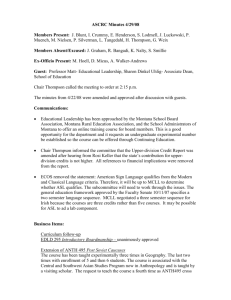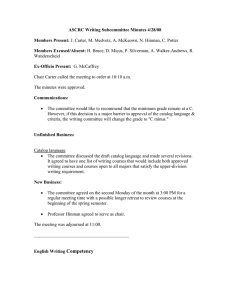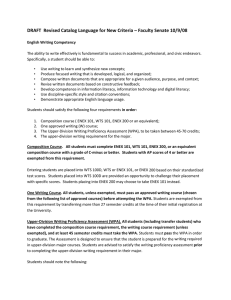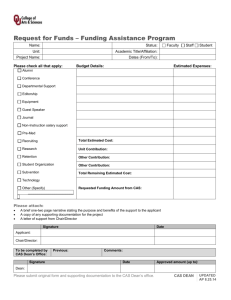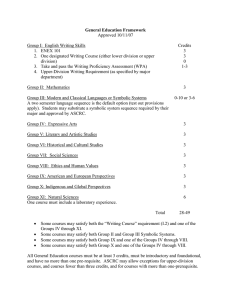ASCRC Minutes 2/26/08 Members Present: Members Absent/Excused:
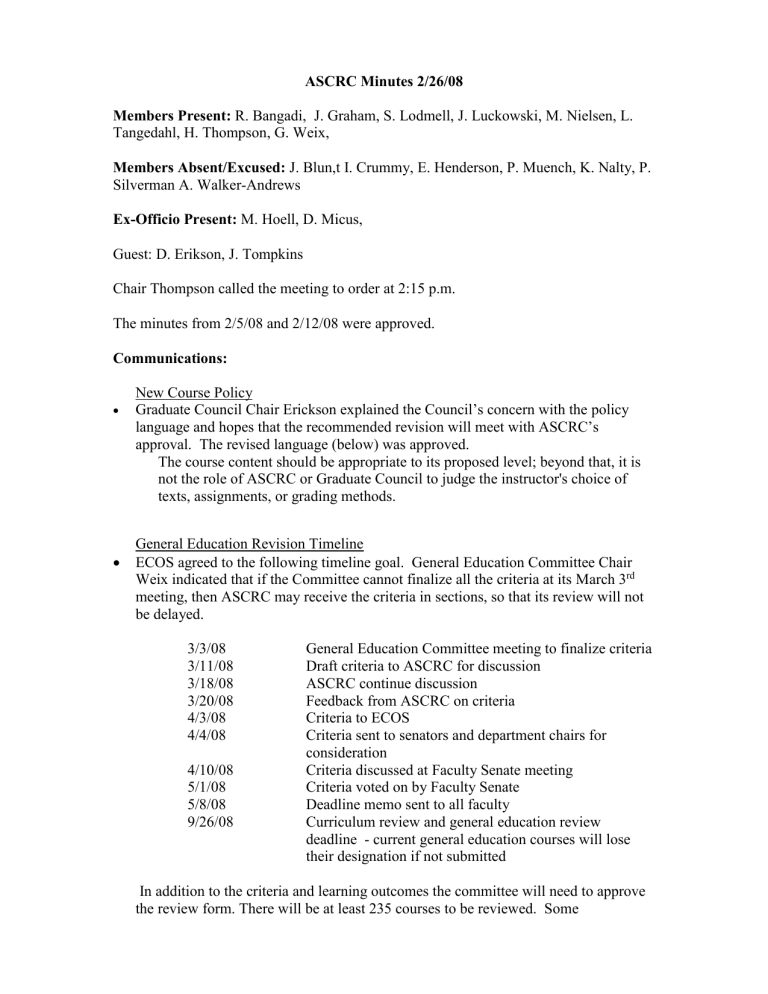
ASCRC Minutes 2/26/08
Members Present: R. Bangadi, J. Graham, S. Lodmell, J. Luckowski, M. Nielsen, L.
Tangedahl, H. Thompson, G. Weix,
Members Absent/Excused: J. Blun,t I. Crummy, E. Henderson, P. Muench, K. Nalty, P.
Silverman A. Walker-Andrews
Ex-Officio Present: M. Hoell, D. Micus,
Guest: D. Erikson, J. Tompkins
Chair Thompson called the meeting to order at 2:15 p.m.
The minutes from 2/5/08 and 2/12/08 were approved.
Communications:
New Course Policy
Graduate Council Chair Erickson explained the Council’s concern with the policy language and hopes that the recommended revision will meet with ASCRC’s approval. The revised language (below) was approved.
The course content should be appropriate to its proposed level; beyond that, it is not the role of ASCRC or Graduate Council to judge the instructor's choice of texts, assignments, or grading methods.
General Education Revision Timeline
ECOS agreed to the following timeline goal. General Education Committee Chair
Weix indicated that if the Committee cannot finalize all the criteria at its March 3 rd meeting, then ASCRC may receive the criteria in sections, so that its review will not be delayed.
3/3/08 General Education Committee meeting to finalize criteria
3/11/08 Draft criteria to ASCRC for discussion
3/18/08 ASCRC continue discussion
3/20/08 Feedback from ASCRC on criteria
4/3/08 Criteria to ECOS
4/4/08 Criteria sent to senators and department chairs for consideration
4/10/08 Criteria discussed at Faculty Senate meeting
5/1/08 Criteria voted on by Faculty Senate
5/8/08 Deadline memo sent to all faculty
9/26/08 Curriculum review and general education review deadline - current general education courses will lose their designation if not submitted
In addition to the criteria and learning outcomes the committee will need to approve the review form. There will be at least 235 courses to be reviewed. Some
departments may elect to drop some of their courses. Professor Weix and Registrar
Micus will meet with department chairs in March to encourage them to think about deciding on general education course offerings as a department and rethinking courses in time to make the 2009 catalog.
The requirement that will likely see a shortage is ethics. After dialogue many of the ethics course instructors agreed that the new criteria were manageable, but would take additional discussion with additional ethics course instructors.
Service Learning Course Review
Professor Bambi Douma has agreed to serve as Chair of the review committee. The deadline memo went out to all faculty. To date no service learning course forms have been submitted.
Business Items:
Curriculum Review Follow-up
The revised catalog language for EVST 494 was approved.
Draft ASCRC Statement – Attributes of CAS dean
The memo was approved with a slight amendment (see appended).
COT Developmental Courses
There was discussion as to whether the Writing Committee should weigh in on this issue. Action on the language was postponed to allow for explanation of why it important to have the NC grading option available for ENEX courses.
ENEX 200 Catalog Language
Associate Dean Tompkins explained the English Composition Placement
Committee’s recommendations for implementation of the new Board of Regents policy on Writing Proficiency. These changes made it necessary to rethink the catalog language to allow for ENEX 200 as a placement option. The writing committee reviewed the language and made some revisions, but further amendment were made by ASCRC (see appended document). The Writing Committee will be asked to approve this via email so that the document can go to the Senate in March.
An explanation of the context should be provided to senators.
Repeat Fee
Discussion of the reasons why students may need to repeat courses was postponed.
Provost Engstrom provided the Good Policy, Good Practices article to ASCRC and
ECOS to be considered in discussion of the repeat fee. It was distributed to members last week. It adheres to the business model of higher education. The Provost would like to collaborate with faculty governance to find a solution to the issue. The
President will not consider removal of the fee.
Upper-division Workgroup Update
Professor Tangedahl researched other universities upper-division requirements and analyzed how many upper-division credits UM students currently have at graduation.
UM is at the mid range of upper division credits required among similar universities.
It was suggested that the UM student data separate out 42 credits since this was one of the increases being considered. ASCRC may want to consider a recommendation to increase the upper-division credits from 39 to 42 or it could simply submit a report to ECOS. (See appended analysis)
Qualitative differences between course levels
Registrar Micus reviewed the catalog and listed the common descriptors for 100, 200,
300, and 400 level courses. There should be language in the catalog that provides students with a better understanding of the expectations of the different level courses.
Professor Weix in collaboration with Melanie Hoell will draft language for the committee to consider.
Curriculum review error
Registrar Micus has discovered that the proposal from Central & Southwest Asian
Studies inaccurately listed current catalog language and therefore the approved changes have not been adequately reviewed. Several of the courses listed included general education designations that have not been approved. The courses also listed current crosslistings with History and Asian Studies that did not exist.
Good and Welfare
Professor Weix would like other members to consider serving as chair of ASCRC to allow her to continue as chair of the General Education Committee.
The meeting was adjourned at 4:05 p.m.
______________________________________
Date:
To:
February 27, 2008
From:
CAS Dean Search Committee
Roberta Evans, Chair
Academic Standards and Curriculum Review Committee
Holly Thompson, Chair
The College of Arts and Sciences has, in some respects, a unique relationship with ASCRC. Significant ASCRC effort is spent working on curriculum that is delivered more frequently by CAS than by other units on campus, such as general education, the core writing and math curricula, courses “common” to many MT campuses, etc. Although there are some clearly defined differences in the responsibilities of administration and faculty governance, we often work closely together on academic issues in order to develop effective policy. With this close
relationship in mind, we would like to see the following characteristics in the next CAS Dean.
1. The Dean should be an individual who respects faculty governance over curriculum issues and understands the advantages of a close working relationship between administration and Faculty Senate. The relationship between Dean Fetz and ASCRC has been open and based on good faith. The new Dean should build on this tradition.
2. CAS, along with the rest of the university, has grown tremendously in the past several decades. One approach to keeping track of all that goes on in this large unit (again, much of the gen ed and other core curricula) is to focus more attention on analysis of quantitative data.
Examples might include distribution of students among the ethics courses (are there sufficient courses to satisfy gen ed demands?); prediction of success in writing proficiency exam based on ENEX 101 results, distribution of teaching by adjuncts vs tenure-line faculty, etc.
3. More than half of the members of ASCRC, Graduate Council and
ECOS come from CAS. Again, as the university has grown, the responsibilities of these committees have grown. The new CAS Dean should recognize the importance of participation in faculty governance.
Thank you for your work on this important search.
_______________________________________
Proposed Changes to English Composition Requirements
To ensure that all graduates have acquired the writing skills outlined above, students must satisfy the following requirements in this order :
1.
ENEX 101 or WTS 101 or ENEX 200 with a grade of at least C (2.0).
2.
One approved writing course.
3.
Passing score on the Upper-Division Writing Proficiency Assessment (WPA), to be taken between 45-70 credits.
4.
The upper-division writing requirement of the major.
Students will be placed into WTS 100D, WTS 101, ENEX 101, or ENEX 200 based on standardized test scores, such as ACT or SAT. Students may be exempted from WTS
101 or ENEX 101 by transferring an equivalent composition course with a grade of at least C (2.0), or by receiving a score of at least 3 on the AP exam.
UPPER DIVISION CREDITS FOR 2006-2007 GRADUATES
UPPER Students
DIVISION w/oTransfer Cumulative
CREDITS Credits Percentage
<20
21-30
31-35
36-38
40-45
46-50
39 145
286
128
16.3%
48.6%
63.0%
51-55
56-60
61-65
66-70
71-75
76-80
81-90
91-100
100+
Totals
94
58
65
28
33
17
17
11
5
887
73.6%
80.2%
87.5%
90.6%
94.4%
96.3%
98.2%
99.4%
100.0%
8
Schools,
120
Hours
Count
**
Minimum
Degree
Hours
120
120
120
120
120
120
120
120
8 Count
Minimum
Maximum
Mean
Median
Mode
**
Minimum
Upper
Division
Hours
40
30
40
30
40
42
36
42
8
30
42
37.50
40.00
40.00
7
3
5
3
43
28
28
17
1
666
Students with
Transfer
Credits
7
50
52
74
90
180
78
Cumulative
Percentage
1.1%
8.6%
16.4%
27.5%
41.0%
68.0%
79.7%
86.2%
90.4%
94.6%
97.1%
98.2%
98.6%
99.4%
99.8%
100.0%
Totals
137
86
93
45
40
20
22
14
6
1553
7
50
52
74
235
466
206
30
31
32
33
34
35
36
Frequency
2
1
Cumulative
Percentage
0.5%
3.7%
7.0%
11.8%
26.9%
56.9%
70.2%
79.0%
84.5%
90.5%
93.4%
96.0%
97.3%
98.7%
99.6%
100.0%
39 Credits
37
38
39
40
41
42 2
8
3

